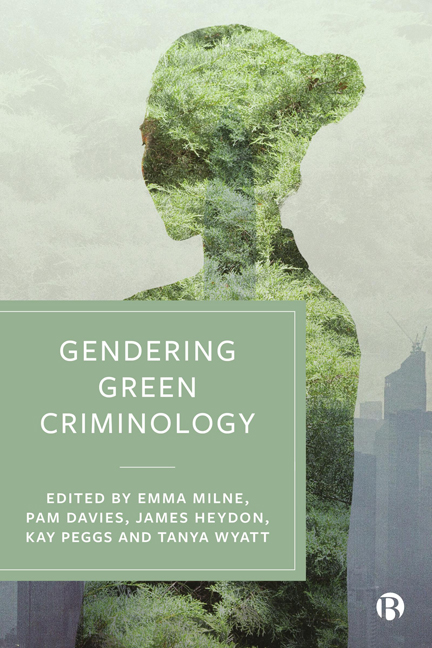2 - Eco-Feminism and the Gendering Green Criminology Project
Published online by Cambridge University Press: 28 March 2024
Summary
Introduction
This chapter follows up on some of the observations made in the introduction to this volume where we briefly reflect on contributions to theoretical approaches notably by eco-feminists. The chapter focuses very specifically on these latter contributions and in the following pages I seek to advance and develop our theoretical and conceptual understanding of green criminology using eco-feminism as the springboard and benchmark for assessing the extent to which green criminology is gendered and for developing a framework for embedding a gendered approach to the green criminological and victimological project. Part of the task that is set for this chapter, therefore, is to help with the review of determining what has been achieved so far, and part is about stepping up and forward to thoroughly gender the green criminological project drawing on appropriate theoretical traditions and trajectories.
Ecological (eco-)feminism holds out for a gender-sensitive form of justice into the 21st century. In lay terms, eco-feminism is a feminist approach to analysing the relationships between humans and the natural world. The foundation of eco-feminism is the relationship between women, the earth and environmentalism. If we take this as the starting point, we can begin to ask some important questions about green criminology. A modern definition of eco-justice is one that encompasses environmental justice (relating to humans and their relationship with specific environments), ecological justice (referring primarily to the health and wellbeing of eco-systems) and species justice (involving rights and biodiversity concerns as these pertain to nonhuman animals and plants) (White, 2013). This definition is also a useful starting point, and conjoining this with our interest in exploring ecofeminism we can illuminate some important features about the state of green criminology knowledge more broadly. For example, we can expose what we know and do not know about who and what perpetrates crime and harm and who and what can be and are victims. The latter thread – the victimological – has been especially underdeveloped and until very recently knowledge of the gendered nature of victimisation has been scant. Broader questions about the nature and extent of victimisation have, however, surfaced such that scholars are now proposing that victimisation extends beyond humans to nonhuman species, that inanimate objects can be a victim, that multi-and poly-species victimisation is experienced.
- Type
- Chapter
- Information
- Gendering Green Criminology , pp. 17 - 33Publisher: Bristol University PressPrint publication year: 2023

